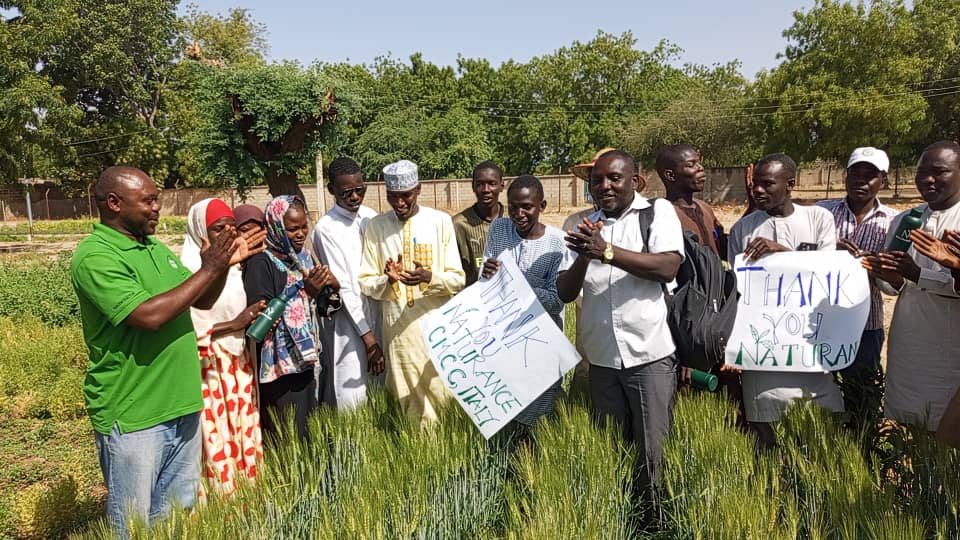Stay connected
Learn about the latest research and results from the project.
Subscribe to the NATURANCE Newsletter!
Learn about the latest research and results from the project.
Subscribe to the NATURANCE Newsletter!
The first round of the Naturethon initiative ran from June to September 2024, with 116 participants divided into 10 groups joining the program.
Naturethon Newsletter #1
Naturethon Newsletter #2
Naturethon Newsletter #3
Naturethon Newsletter #4
22 groups had registered for the first round, representing 303 participants from Ethiopia, France, Iran, Italy, Nigeria, Portugal, Slovakia, South Africa, and Spain. Project proposals were submitted by ten groups, covering five European countries (France, Italy, Portugal, Slovakia, and Spain), three African countries (Ethiopia, Nigeria, and South Africa), and one Middle Eastern country, for a total of 116 participants.
The groups that submitted proposals had an average of 12 participants, with a minimum of 3 and a maximum of 49 members. Notably, eight groups had 50% or more female members, highlighting the initiative’s commitment to gender diversity and inclusion. Among participants contributing to submitted proposals, 40% were under the age of thirty, while 60% were over thirty.
The groups explored potential local NbS applied to a variety of contexts, including agricultural, coastal, and urban environments; some projects considered multiple contexts simultaneously. Several proposals addressed multiple benefits, often going beyond environmental impact to include citizen engagement, social improvement, and economic advantages. All submissions gave careful attention to social issues, reflecting on how their projects could meaningfully improve their communities


Green Laboratory for the Assessment of NbS Effectiveness (Slovakia)
This group of Slovak students and experts is working on the implementation of two green roofs – one of which will experiment with innovative techniques for selecting plant species and soil types – and three green walls in Bratislava. The project applies specialist research to benefit the community, testing structures designed to improve quality of life in the city.

Regenerative Agriculture and Food Security (Nigeria)
This project focuses on regenerative agriculture, highlighting the benefits of nitrogen-fixing crops, such as legumes, in crop rotations. These crops naturally enhance soil fertility by converting atmospheric nitrogen into a form usable by plants. The project proposes reducing or replacing synthetic fertilizers, providing environmental benefits while also offering economic advantages for farmers through more sustainable yields and lower production costs.

Green Infrastructures for Water Management in Valencia (Spain)
This project tackles droughts, urban flooding, and heat in Valencia by integrating green infrastructure – such as green roofs, permeable pavements, and rain gardens -to capture, manage, and reuse rainwater. The proposed solutions provide environmental benefits, like flood reduction and aquifer recharge, and social benefits, including improved quality of life and increased awareness of Nature-based Solutions through the University of Valencia.

Os Rapazes de Mathos’ (Portugal)
The project focuses on Matosinhos Beach, which is negatively impacted by a concrete walkway that complicates stormwater drainage and storm recovery. The group proposes replacing the walkway with a system of dunes and wooden gangways to reduce coastal erosion and enhance the landscape. The team suggests funding the project by imposing a tourist tax, thereby minimizing the financial burden on the local community.
Andrea Staccione (Karlsruhe Institute of Technology) and Alfredo Reder (CMCC) introduced the concept of Nature-based Solutions and their many contexts of application regarding their ability to work positively in mitigating the effects of climate change and disaster reduction.
In addition, the webinar emphasized the importance of local communities and citizens, whose participation in developing shared knowledge and creating a critical mass in their territories is essential for implementing resilient ecosystems.
Insurance is often regarded as a valuable tool to adapt to climate change and the mounting risk this generates for society. Stefano Ceolotto (CMCC) reviewed the current state of the market of climate risk insurance across European countries, and elaborated on the relationship between NbS and insurance, highlighting successful examples and limitations to scalability.
Georges Farina (VU-IVM) focused on green roofs as NbS adapted for urban adaptation challenges. The objectives of his study are to identify, through surveys and economic experiments, what is the demand of the Dutch population for green roofs, how green roofs can be upscaled in the Netherlands, and through which incentives.
Silvia Ainio, a climate policy expert specializing in international climate negotiations and sustainable finance, provided a global overview of the main challenges in financing nature-based solutions, particularly related to scaling up the role of the private sector, and illustrated a few innovative examples on how could these be overcome.
Following, Marianne Zandersen, professor in environmental economics at Aarhus University, Denmark, talked about social and economic benefits and values from NbS at the urban scale, focusing on well-being and health values. She showed an example of a mixed method approach that considers the multiple values that we might assign to NbS on the benefits, importance and usefulness of NbS.